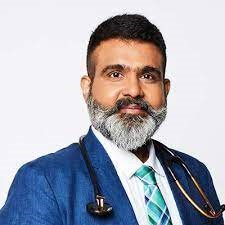Expert Insights from Prof. Dr. Rohan Savio Sequeira

In spite of the many decades of anti-smoking campaigning, smoking remains one of the leading causes of preventable deaths across the world. In Sri Lanka, smoking-related diseases continue to be a burden on the healthcare system and takes a heavy toll on public health. As health advocates and policy makers seek solutions for this issue, Tobacco Harm Reduction (THR) is emerging as a powerful, effective strategy, that is backed by science, real-world success and medical experts.
In an exclusive conversation, Prof. Dr. Rohan Savio Sequeira, a leading Consultant Cardio-Metabolic Physician and Specialist in Non-Invasive Cardiology, Diabetes, Endocrinology, and Obesity Management, shares his valuable insights on how smokeless products such as vapour products, heated tobacco products and oral nicotine pouches have made a viable impact on countries such Sweden, Japan, and the United Kingdom, and the lessons Sri Lanka can take from it.
Q: How have smokeless products contributed to reducing smoking-related deaths in countries that have embraced them?
There is clear evidence that smokeless products deliver tangible and measurable reductions in tobacco related death. Countries such as Japan and the United Kingdom and have gained historic reductions in smoking by offering low risk, scientifically validated alternatives to combustible cigarettes. Japan has seen a significant 30% drop in cigarette sales since the introduction of heated tobacco products, which contributed to a significant improvement in public health. Essentially, when safer, less harmful options are made accessible, and are properly regulated, smokers are more responsive, and societies enjoy life-saving rewards.
Q: What lessons can Sri Lanka learn from scientific case studies where vaping and oral nicotine pouches have successfully reduced smoking rates, and what economic and social benefits could the country experience by adopting a similar THR strategy?
It is important that Sri Lanka recognises that traditional prohibitionist approaches have not been effective in solving the increase in smoking. They could learn from the countries who have successfully implemented THR strategies, as they have not only improved public health, but have also unlocked a host of economic and social benefits. It is a given that fewer smoking-related illnesses, equates to lower healthcare expenditure, and a much healthier, more productive workforce.
It is also essential to note that controlled, legal markets for lower-risk nicotine products, not only generate tax revenue, but also helps mitigate illegal sales. One of the most important things to note, is that lives are saved, families are preserved, and stronger communities are created. Sri Lanka has a golden opportunity to build a smarter, healthier society by embracing and combining tobacco control efforts with harm reduction science.
Q: How can Sri Lanka implement a science-backed THR framework that balances public health safety with effective regulation?
What Sri Lanka needs is a regulatory model that understands and acknowledges the gamut of risk associated with smokeless nicotine products. This is primarily because treating all nicotine products with a one-size-fits-all approach, ignores an overwhelming amount of scientific evidence. Now, combustible cigarettes should be very well regulated, which is the case in Sri Lanka. However, the less harmful alternatives must remain accessible to adult smokers, especially those who are looking to completely switch or reduce their risk. This requires the implementation of strict manufacturing standards, clear marketing rules that do not appeal to youth, and accurate public health messaging about the relative risks. It’s simple, smokers will make better choices when they are empowered with scientifically accurate information.
Q: What are the key scientific and policy barriers to Tobacco Harm Reduction (THR) adoption in Sri Lanka, and how can they be addressed using evidence-based solutions?
One of the biggest barriers is misinformation, in particular the extremely outdated misconception that nicotine use is harmful. In reality, nicotine is just as much as a stimulant as caffeine, and has never been proven to cause cancer. Its delivery system on the other hand, has proven to cause cancer. Specifically, combustion, which is the process that occurs when a cigarette is lit, forming cigarette smoke, , is known to cause the overwhelming majority of tobacco-related diseases.
Another major obstacle is regulatory inertia, which basically means there are policies in place that have not kept up with relative scientific advancements in harm reduction. In order to move forward, Sri Lanka must champion local conducted scientific studies, so that products can be assessed objectively, update regulations to reflect real-world risk profiles, and foster discourse that views harm reduction as an ally and not as an adversary of termination efforts.
Q: How can evidence-based advocacy, scientific research, and healthcare professionals’ expertise be leveraged to integrate THR into Sri Lanka’s public health policies and promote scientifically accurate information to smokers?
Change must be driven by trusted voices such as healthcare professionals, researchers and of course, public health advocates. These groups have the credibility, expertise and support to advocate for more grounded polices that are evidence-based as opposed to those proposed based on an ideology.
Through locally conducted studies and research, and the publication of clear, accessible information, and education campaigns that engage and educate the public, existing perceptions around nicotine can be shifted. This will empower smokers to make safer choices. Integrated health policies must recognise the reality that harm reduction is not a replacement for cessation, but an essential complement, that reaches those who cannot or find it difficult to switch through abstinence alone.
Q: How can Sri Lanka use scientific risk assessments to ensure that Smokeless products are accessible to adult smokers while preventing youth initiation?
Policy must be guided by science, and not by fear or politics. Rigorous risk assessment can influence regulations that these products are only made available to adults, through age restrictions in retail environments. Sri Lanka can deploy measures to protect the youth such as restricting marketing that targets minors, restricting flavours that attract the youth if necessary, and by enforcing clear labelling standard.
Over-restricting access to these smokeless products will only perpetuate the current increase in smoking, or drive unregulated, and illicit markets. Smart and properly balanced regulations will both protect the youth and provide adults with life-saving alternatives.
As Prof. Dr. Sequeria has pointed out Tobacco Harm Reduction is not a mere theoretical concept. It is a proven, scientifically directed health strategy for the public which can potentially save thousands of lives. Many countries around the world have shown that safer nicotine alternatives, that are made accessible by balanced regulation and honest public communication, have led to a reduction in smoking, disease and longer lives.
The path is clear for Sri Lanka. Embracing a scientifically directed and compassion-driven THR framework, will help modernise the country’s public health approach, but also empower every smoker, to completely switch to safer alternatives.
About Prof. Dr. Rohan Sequeira
Prof. Dr. Rohan Sequeira is a senior Indian cardio-metabolic physician with over 30 years’ experience in non-invasive cardiology, endocrinology, diabetes, and obesity care. Based in Mumbai, he consults at Jaslok, Breach Candy, and Holy Family Hospitals. A Harvard-trained PhD in Endocrine and Metabolics, he is a fellow of leading international medical bodies and served as Honorary Consultant to the Governor of Maharashtra. Founder of Queira Technologies (ClinicJet.com) and associate editor for Journal of Internal and Emergency Medicine (Italy), Dr. Sequeira champions tobacco harm reduction and evidence-based public health policy.


Recent Comments